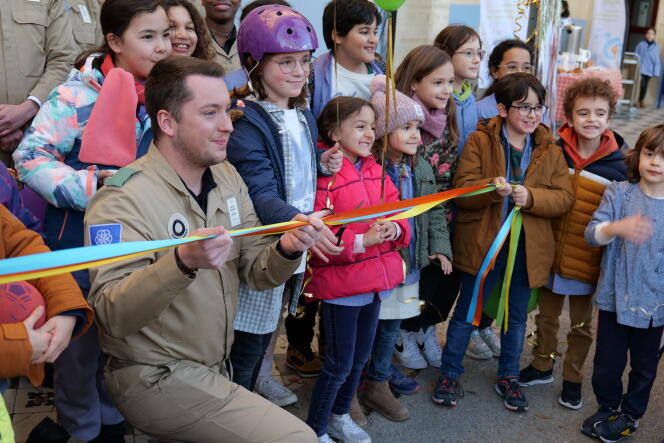


His story is harrowing, yet now he tells it without shedding a tear. Perhaps a familiar narrative for the thousands of young people who, like him, have endured harassment, taunts, and blows in middle or high school, but especially poignant when a 27-year-old man calmly recounts what led him to the brink of death. However, it is his incredible resilience afterward that is most impressive: Lenny Pamart has managed to transform his suffering into a project that could now help all those who have experienced the schoolyard hell.
On that day in Brussels, the young man shares his experiences and his project, Campus Watch (his non-governmental organization accredited by the United Nations), with Belgian specialists. Lenny Pamart has come a long way since his first year at the Georges Brassens middle school of Lattes (a town located in the Hérault region of France), the site of what he calls his "black year," his "shock treatment." Today, during his missions, Lenny can wear a beige uniform emblazoned with "UN" and proudly display the badge that allows him to enter United Nations buildings in Geneva, New York, or Vienna.
From these locations, as president of his NGO, he tirelessly advocates for what he calls "healthy and positive school climates." Safety, emotional support, dedicated spaces, individual freedom, combating discrimination, well-being, and respect for rhythms: these are some of the twenty-four objectives outlined in a convention he managed to have adopted in Geneva in 2021 by the UN Committee on the Rights of the Child. The following year, Campus Watch submitted a request to establish a highly symbolic "World Day for School Climates."
The NGO's charter advocates for "a fair school environment that respects residents' rights and manages conflicts" – in essence, everything young Lenny did not experience. Once a teenager, he recounted his story in a book published in 2013. Arrêt Demandé ("Stop Requested," Publibook) is a testimony, as stark as it is poignant, of one of those differences which, as Stendhal wrote, can "breed hate." For Lenny, it is his stutter, a condition he's had since age 4. It was a handicap he battled relentlessly, though it remains nearly imperceptible today. Yet, as he wrote, it trailed him everywhere, inviting sarcasm, insults, and brutality from others.
In middle school, following an English lesson that included a viewing of Harry Potter and the Sorcerer's Stone, classmates bestowed upon him the nickname "Professor Quirrell," after a character in the film who stutters. From that moment on, the entire school adopted the moniker, exacerbating his isolation, loneliness, and profound sense of alienation. Lenny refrained from confiding in teachers or parents, feeling pursued both within the walls of his school and beyond.
You have 60.84% of this article left to read. The rest is for subscribers only.
